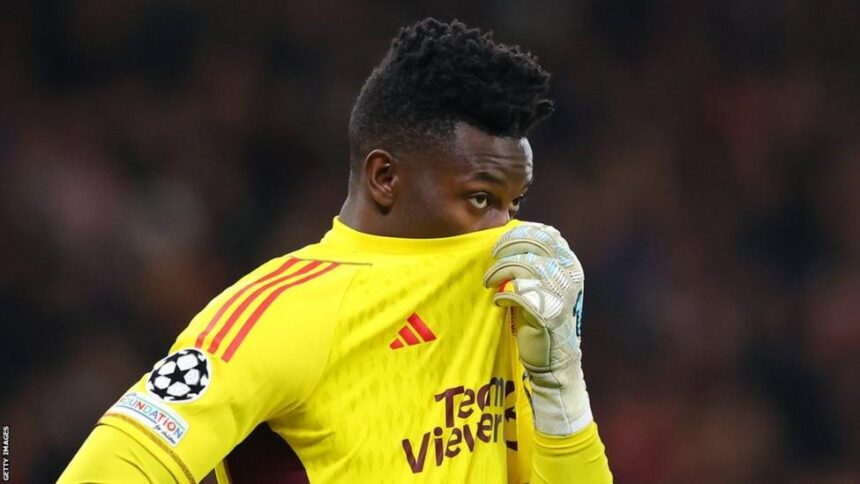Man Utd’s Champions League Saga: Unpacking the 0-1 Defeat to Bayern Munich

Manchester United’s comeback to the Champions League was indicative of Erik ten Hag’s influence, signaling a transformative era at Old Trafford.
It aimed to validate that United had reclaimed their rightful place, following setbacks and challenges under Louis van Gaal, Jose Mourinho (despite winning the League Cup and Europa League), and more recently, Ole Gunnar Solskjaer.
While Ten Hag secured tangible success with a League Cup win in his inaugural season, this disappointing Champions League campaign serves as a critical gauge for Manchester United and their manager. The once-great transformer now appears closer to a downturn in fortunes.
READ ALSO: Transformed Arsenal Draws at PSV in Champions League Finale
This campaign has been truly shocking, a sobering reality check as United ended up at the bottom of a group they likely welcomed during the draw, finishing fourth behind Bayern Munich, FC Copenhagen, and Galatasaray.
The Champions League proves to be an unforgiving environment, laying bare every flaw of United, and they undeniably have their fair share. From the outset, these shortcomings have been brutally exposed.
It concluded in the most subdued manner – a United side, expected to be assertive, succumbed to a 1-0 defeat against a Bayern team with nothing at stake. Ten Hag’s players managed only one shot on target in the process.
A stark contrast from the nights of old at Old Trafford, where supporters stayed glued to their seats until the final whistle. However, on this occasion, thousands of United fans had given up and left long before the end – a move that’s hard to blame given the circumstances.
United’s Champions League Comeback: A Statistical Shambles
The statistics deliver a damning verdict on United, highlighting a lack of organization, tactical acumen, nous, and basic quality that have defined their Champions League return and much of their season. With only four points from six games, this campaign marks their lowest in any Champions League venture. Additionally, conceding 15 goals sets a grim record as the most by a Premier League side in any group stage of the competition. While inquests into this dismal failure abound, the fundamental issue remains—this Manchester United side lacks the essentials for success, compounded by a tendency to self-sabotage at the worst possible moments.
Goalkeeper Andre Onana endured a nightmare campaign, contributing to pivotal losses and gifting goals in crucial moments. Despite the departure of David de Gea, Onana has failed to prove himself as an adequate replacement. From a two-goal lead lost in Copenhagen to the collapse against Galatasaray, United’s Champions League comeback is nothing short of a shambles, emphasizing the need for significant improvements.
Old Rivals Bayern Ease Past Lackluster United
On a night demanding a display of determination from United, they managed just five shots when victory was imperative. Injuries to key players like Harry Maguire and Luke Shaw undoubtedly hampered their efforts, but no excuses can justify the overall poor performance of a team falling short of Manchester United’s standards. Despite Bayern not being a classic powerhouse, they effortlessly dealt with United, raising doubts about this team’s capabilities even against formidable opponents.
This encounter highlighted the lack of urgency and pace in United’s play, a stark contrast to the side that didn’t need to prove anything. Bayern operated without breaking a sweat, showcasing their ability to dismiss United without much fuss. The home fans, though patient, couldn’t conceal their disappointment, with jeers at the final whistle reflecting more resignation than anger. Throughout this ill-fated campaign, United has affirmed some uncomfortable truths—none of which are positive.

Finishing Bottom of the Group: The Unavoidable Verdict
Manchester United’s placement at the bottom of Group A is not a disservice; it’s the appropriate outcome affirming that, for now, they don’t belong among elite company. Their struggles against the likes of Bayern, Manchester City, and Real Madrid underline that these football powerhouses are currently out of their league.
At the center of this predicament is Erik ten Hag, grappling with the challenge of taming a football beast that seems increasingly unwieldy. His managerial prowess appears to be sinking, trying to fathom how the slivers of optimism from the previous season have swiftly given way to despair and despondency.
Facing an uphill battle, Ten Hag must now seek improvement in another unforgiving environment—Anfield, against Premier League leaders Liverpool. This daunting task becomes even more challenging with key players like Shaw, Maguire, and captain Bruno Fernandes likely sidelined due to injuries.
If United harbored hopes that their return to the Champions League would signal a resurgence toward the top, the reality check is stark—they weren’t even good enough to secure the safety net offered by the Europa League. This outcome provides a stark reminder of where they currently stand in the football hierarchy.





